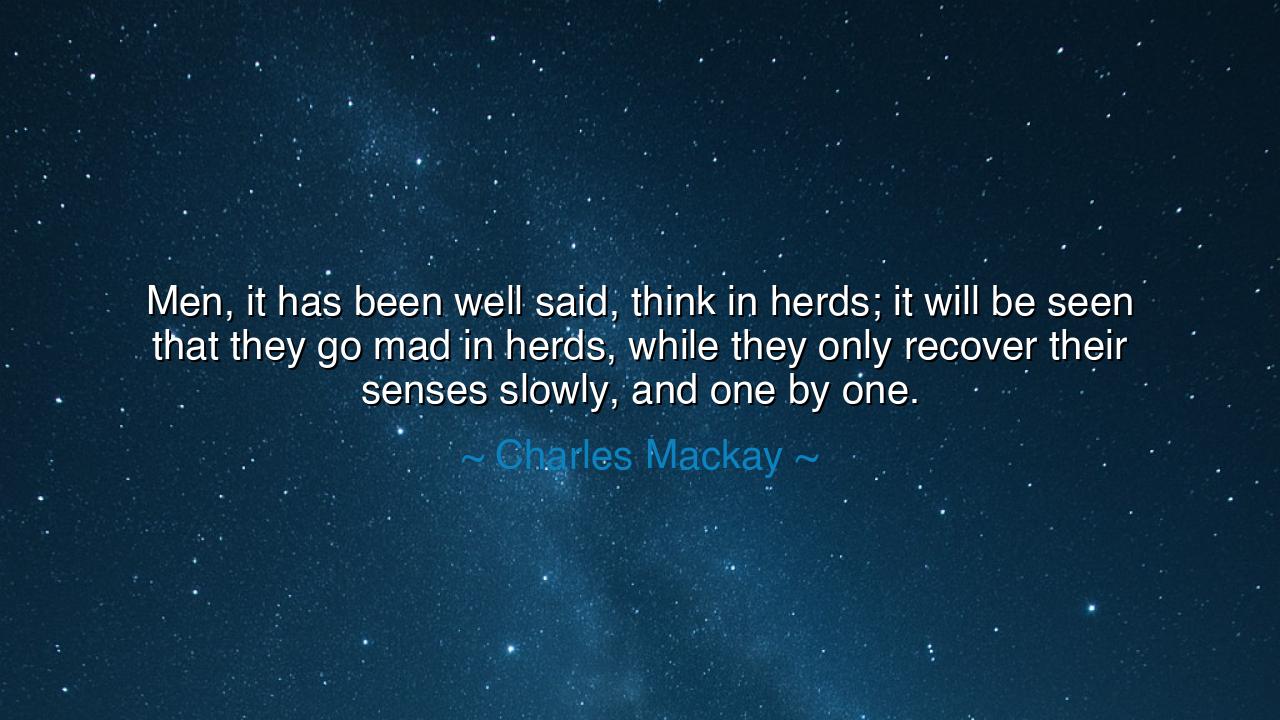
Men, it has been well said, think in herds; it will be seen that
Men, it has been well said, think in herds; it will be seen that they go mad in herds, while they only recover their senses slowly, and one by one.






Hear the voice of Charles Mackay, historian of folly and witness to the madness of crowds, who declared: “Men, it has been well said, think in herds; it will be seen that they go mad in herds, while they only recover their senses slowly, and one by one.” These words strike like thunder, for they reveal a truth that has haunted humanity since the dawn of civilization: that the multitude is quick to frenzy, but slow to wisdom; quick to follow error, but hesitant to embrace reason.
The meaning is sharp and timeless. When men gather in herds, they cast aside their individuality. The single mind, capable of doubt and reflection, becomes absorbed into the will of the many. Fear spreads like fire, greed multiplies like a plague, and desire blinds the eyes of reason. This is why crowds can be swept into riots, why nations can march into war, why whole economies collapse into ruin: the herd does not think, it feels—and its feelings run wild. Yet when the madness subsides, the return to senses comes slowly, for each person must awaken alone, must climb out of the pit one by one.
The origin of Mackay’s words lies in his great work, Extraordinary Popular Delusions and the Madness of Crowds, where he chronicled the frenzies of human history. He told of the Tulip Mania in seventeenth-century Holland, when common bulbs were sold for the price of houses, only for the illusion to shatter and ruin to follow. He spoke of South Sea bubbles, of alchemists, of witch hunts—all moments when herds ran headlong into madness, and only after devastation did men return to reason. Mackay’s quote is not mere theory, but observation carved from the records of history itself.
Consider, too, the tale of the witch trials in Europe and America. Whole towns, seized by fear, accused neighbor after neighbor, until reason was drowned in hysteria. The herd demanded blood, and innocent lives were taken. Yet the awakening was slow; only when individuals—judges, ministers, thinkers—dared to step aside from the madness did sanity return, and even then, it returned one mind at a time. Here we see Mackay’s wisdom: madness is contagious, but reason spreads slowly, like a lamp passed from hand to trembling hand.
This truth is not confined to history. Even in our own age, men are swept by tides of panic and fashion—financial markets that rise and fall with sudden frenzy, crowds driven to outrage by rumor, whole societies following the roar of voices rather than the whisper of truth. The lesson remains: the herd is powerful, but not always wise. If one would live well, one must learn not to be swept away by its madness, but to stand apart, to think, to question, to wait until clarity shines through the fog.
The danger lies in comfort, for there is ease in following the herd. It takes no courage to run where everyone runs, to shout what everyone shouts. But it takes great strength to pause, to ask, “Is this true? Is this just? Is this wise?” The herd may mock the one who questions, but in time, when the madness has passed, it is those who stood firm who are remembered as pillars of reason.
Practical action flows from this wisdom. Train yourself to pause when crowds surge. Do not buy because all are buying, nor hate because all are hating. Search for truth beyond the noise, and measure decisions by reason, not frenzy. And when madness grips those around you, do not despair—remember Mackay’s teaching: recovery comes slowly, but it comes. Be patient, hold fast, and light your lamp of reason, that others, one by one, may find their way back from the darkness.
Take this as a guiding flame: men go mad in herds, but return to sense one by one. Therefore, do not entrust your soul to the herd, but to truth. Be willing to stand alone, for in the end, it is the solitary seeker of wisdom who leads the way out of the madness of the many.






AAdministratorAdministrator
Welcome, honored guests. Please leave a comment, we will respond soon